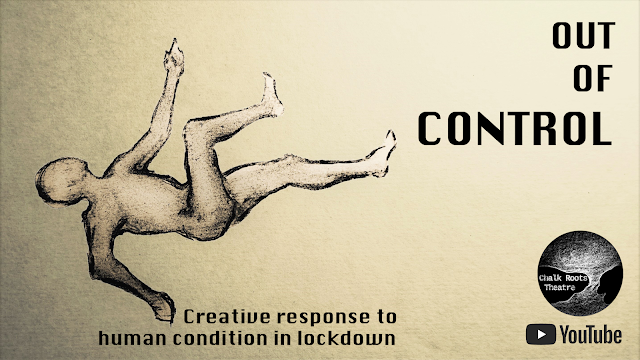Out of Control
Thoughts On: Out of Control (2020)
A reflection upon worldwide lockdown in six episodes.
The following is a brief exploration of an experimental serial composed of various monologues, each of which explore the mental, emotional and existential strain of isolation. All are framed within a meta-series presented by a cowboy committed to self-isolation. All episodes can be watched here.
The tone is immediately set out; this work is a product of the absurd: a stream of unconsciousness marked at each passing point by strange inflections of conscious thought. A man tells us of his mother's reflections upon an artwork that causes him to orgasm. The monologue is one about the discomfort arisen from archetypal flow: the mind following the archetype from form down a fractal tunnel toward the sublimely, tangibly unknowable. Thus, a South Asian artefact is related to the subject's mother through sexual innuendo. A Freudian schism schemes its way between spirit and sensorium; the archetypal underpinnings of 'mother' breathes, and, simultaneously, so does the sensual anima. Their conflation under the greater archetypal Eros creates a strong wind that, you could say, blows the subject away. He orgasms in embarrassment, not understanding his inability to measure and control the various Erostic forces. The absurdity of this drama is deposited within an evocatively shaped fruit; a pear through which all descriptions of female bodily form are visualised. The pear is symbolic of Eros; it is a fruit and seed - it is that which represents the passing of life between mother and son. The continuation of this human impulse to bear fruit culminates within the mature mind as a sexual act. Memories of childhood persist nonetheless; the fruit then suddenly appears wrongly erotic. How confusing. How silly. How absurd.
The issue of this matter is difficult to articulate but it is hinged upon the intersection of sex and child, the conflation of the sexual and life-bearing form. Colonisation is evoked in jest, for these issues inherited to the soul of men appear at many passing moments to be grounded in stolen lands of the other. The collision of personas and conundrums is evoked by four tinted frames; the productions of this aesthetic could be spoken of in many ways, but each hard to come by. This is an ingenious short that expresses the effect of fractured shards of life coming together within the chest of an individual: pain, confusion, pleasure, delirium.
"Why can't I be a part of society without being charged for it?"
A reflection on "French" iconography and values during times of struggle, this monologue precisely articulates the sensation of being caught between national promises and inherited morals. The heart and consciousness of the speaker battles under the influence of these great cousins, one a song of the zeitgeist inducted into tradition, the other a by-product of the mess that is the reality of things as computed by the human mind. Faith in national mantra then fades as morality tries to pick up some of the pieces. Ultimately, the fundament of all lamentation is that one must pay to be part of a greater whole - and that what comes natural to the individual is oft not accepted currency, other times it is subject to shoddy exchange rates. The structure of the thoughts is impeccable, the set-design is simple and direct; photogenie is produced with ease from such a nice performer and performance.
Intensely, uncomfortably erratic, mania is presented via the fractured self - a self fractured by embarrassment and betrayal. The pain within the monologue is rather palpable, the juxtaposition of two stories as metaphorically concise and almost as literal as it is evocative. Analysis is not then as necessary as experience.
I have often thought the fox to be the UK's national animal - easy it is to pour ones heart and thoughts into it when they wander in shadow.
The body is an uncomfortable place. The contemplation of the destruction of this form is common in the mechanical world. When machines clearly do not think and yet do, and when humans watch and imitate, there arises a deep conundrum; it rests on the line between body and mind. Machines are bodily unlike us, but it is impossible to ground this assumption in our very own corporeality for the fact that our forms are detached from the mind (or at least it seems). The mind has its influence on the form. This is what one feels until the body begins to make its impressions on the mind, opening doors to depression, anxiety and more. For no one believes that they think these demons into existence: they manifest themselves in automation. Maybe it is the body that is ultimately uncomfortable with itself, and the mind can only sit from afar and hear and feel and reflect. Yet with the bodily form bouncing from mirror to mirror, bathroom's to mind's, there arises an impossible problem. How to expel demons in the body when one only has control of the rather useless mind?
Normalcy comes to possess the body via anxious hysteria when relegated from familiarity. What are we to make of the abnormal familiar, and how does it impact us? New normalities create new people out of those who attempt to attune to it. Yet as we come to grips with who we've become, there too remains the question of who everyone else is now. Strange people make strange streets and strangers walking them don't help.
The cowboy speaks again. An observer and reflection throughout the series, he presents now, coming to encapsulate a general response to trauma; a seclusion to the dysfunctional self. The presentation of this ego is amusing and revealing of the trappings of isolation.
Many thanks to Saulius Kovalskas for sharing his inspiring work with me. I encourage you, if you have not yet, to watch this series and share your thoughts also. The playlist can be found here.
















